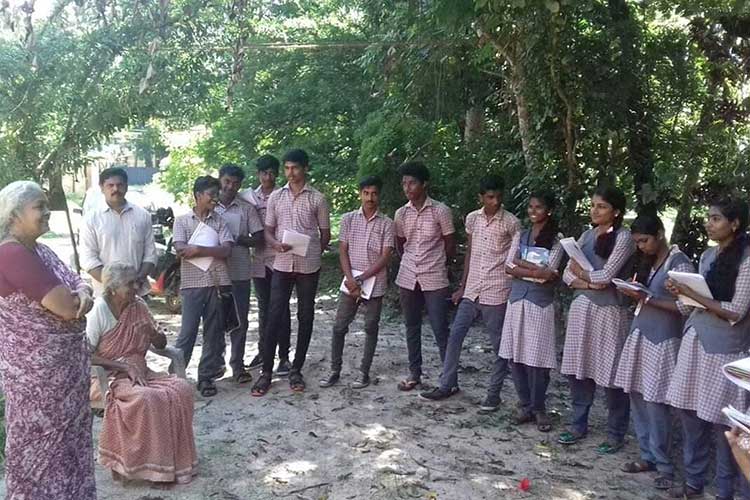
Alleppey, a coastal district of Kerala, doesn’t have any natural forest land. Still, its sandy white soil and harsh environment didn’t stop Mrs. Devaki Amma Kollakal Thapovanam from cultivating her four-odd acres of property in Kandalloor (a small panchayat in the taluk ofKarthikapally) with greenery.When I visited Mrs. Devaki Amma’s patch of forest in 2013, I was amazed by the luxuriant flora and fauna it supports. The property has become an ecosystem of its own.
Mrs. Devaki Amma inherited her love of horticulture from her grandfather, a Vaidyan (traditional medicine man) who used to insist his patients to bring a seedling of the medicinal plant, if that particular plant is not found in their backyard. Mrs. Devaki Amma herself was crippled by a car accident , and found herself unable to return to the rigors of farming after her convalescence.Nonetheless, she did not lose spirit. Rather, she began to seek a healing approach for her land, ridden by drought, and by extension for the planet. Inspired by her daughter Thankamoney, a Professor at the College of Engineering and Technology (CET) in Thiruvananthapuram, Mrs. Devaki Amma dreamed of establishing a new agricultural system based around the Poly Home and forest farming concepts.
Karthikapallyand its surrounding taluks were historically known as“Onattukara,” a name which refers to the bountiful rice harvest reaped during the annual festival of Onam. Before Mrs. Devaki Amma’s Kandalloor property was converted, it was one in a sea of paddy fields, with only a few trees to demarcate her land’s borders. The fields sustained locals during the rainy and summer season, while coconuts, a variety of tubers, and sesame provided dry season income for Mrs. Devaki Amma’s family during lean periods. The property boasted four ponds: one close to the main residence for drinking and cooking, one for bathing and washing, one for cattle, and the last for irrigation.
Today, the majority of Mrs. Devaki’s arable property has been adapted from farmland to a new ecological and economic purpose. Most of the trees, shrubs, creepers, climbers and medicinal plants were planted by Mrs. Devaki Amma in the aftermath of her car accident. Despite her lack of formal education in environmental science and botany, Kollakal Devaki Amma firmly believes that planting trees can save the world from the impending threat of climate change. This invaluable conviction was imparted to her by her beloved teacher, M.K. Gopalakrishna Pillai, before his death; she in turn passed it on to her children, grandchildren, and great-grandchildren.Together, the family has built a kind of Noah’s Ark on their homestead, lovingly nurturing species both endangered and common.
This has been no easy feat.The coastal white soil of Alleppey doesn’t retain water as effectively as loamy soil; earthworm droppings testify as to its paucity of nutrients.To combat the barrenness of the soil, Mrs. Devaki Amma grows her trees separately and replants them along with composted leaves once they are well-established saplings.She has also replaced her original four ponds with two reservoirs for rainwater collection, since the precipitation which makes it to the forest floor dries in the summer heat before penetrating the topsoil.
Mango, mahogany, teak, tamarind, coconut, jackfruit, anjili,sandal, elephant apple, jamun,Pongamea, Asoka, Shimshipa, Brownia, cannonball, tamarind, bauhenia, neem, and pine trees number among the many species which Mrs. Devaki Amma cultivates. Some, such as the guava and java apple trees, are remarkably prolific, flowering and reproducing regularly. Others, like the Kayampoo, require constant care and attention. For this reason,visitors are restricted from taking away cuttings of the trees for their own properties and gardens, though Ms. Thankamoney provides saplings upon request. Mrs. Devaki Amma has introduced some rare plants – Lakshmi tharu (Simaroubaglauca), Chinese orange (Citrus microcarpa), nagapoomaram, ankolam (Alangiumsalvifolium) – alongside the endemic species; all her plants thrive harmoniously with one another despite their varied origins, from the furthest reaches of the Himalayas to Kanyakumari.
The propertyis a wonderful example of a perfectly maintained food forest. As I entered Mrs. Devaki Amma’s forest farm via the small lotus pond and paddy which she retains for the sustenance of family and neighbours, I was greeted by an abundance of flowering plants: rajamalli, shoe-flowers, cosmos, marigolds, balsams. Butterflies flocked to pollinate the inviting bouquets. Paradise flycatchers took dips in the pond to cool off and satiate their thirst while emerald doves, usually shy and elusive, roamed around the garden.Ms. Thankamoney, who was herself instrumental in greening the CET campus, walked me around the cool green backyard, identifying and describing the various species. Through her keen eyes honed by years of observation, I began to understand the complexities of plant-plant interactions. Some plants are finicky, she explained; they can’t tolerate certain species growing near them. Others will let anybody grow on them and share whatever they have with their neighbours wholeheartedly.
In the foreword of Peter Wohlleben’s book, “The Hidden Life of Trees,”conservationist Tim Flannery discussesthe social life of trees: how trees care for their fellow trees and stumps, how they are intimately connected in a “wood-wide web” of vegetation and fungi,sharing a wealth of information and resources.Standing on those four acres of land, I, too, could begin to see the secret communications between trees, undergrowth, and burgeoning saplings.
In 2003, the Indian Ministry of Environment and Forest selected Mrs. Devaki Amma to receive Indira Priyadarsini Vriksh Mitra (IPVM) Award, a prize which had previously been granted to CET Thiruvananthapuram for the policies spearheaded by Ms. Thankamoney. Mrs. Devaki Amma continues to be recognized at the regional and national level, most notably winning Malayala Manorama’s Water Conservation Award, the Kerala State Government’s Vana Mitra Award for Green Ventures, and the 2018 Nari Sakthi. Mrs. Devaki Amma also currently serves as Allepey’s Green Ambassador. Let’s hope her tireless work towards protecting biodiversity remains a driving force for India’s environmental awareness and conscience.
Prepared by Veena M, Thanal, Maruthoor, Vattappara P.O. Trivandrum 695028
e- mail id [email protected]











































